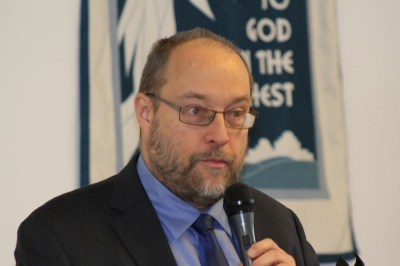Support Obama's UN Resolution on Nuclear Testing

Sometimes, ordinary people do extraordinary things that change the world for the better.
A quarter century ago, a popular movement in Soviet-controlled Kazakhstan forced Moscow's communist regime to halt nuclear weapons testing at proving grounds in their homeland where more than 456 explosions had contaminated the land and its people. The last Soviet nuclear test was on August 29, 1991 — a day now celebrated each year as the International Day Against Nuclear Tests.
The Soviet Union and the Cold War now seem like ancient history, but many of the weapons that were produced decades ago during that conflict inexplicably remain on hair trigger alert and still threaten us all. Whether they are exploded by computer error, human miscalculation, terrorists or mad men, the result would be an end of life as we know it.
Next week I will travel to Kazakhstan to join the Parliamentarians for Nuclear Non-Proliferation and Disarmament in a conference marking the 25th anniversary of the last Soviet nuclear test. We will discuss how to make sure that no new nuclear weapons designs are ever tested again. This is one feasible step we can take now to reduce the danger of nuclear annihilation under which we all live.
The United States has not conducted any nuclear test explosions since September 1992. Four years later, the French and Chinese halted their programs. The Comprehensive Test Ban Treaty (CTBT), a global verifiable treaty to ban all nuclear test explosions was negotiated and opened for signature on September 24, 1996.
We can thank God that, 20 years later, nuclear explosions testing is still taboo. One hundred and eighty-three countries, including the United States, Russia and China, have signed the CTBT. Only one international state — North Korea — has conducted nuclear test explosions since 1996. But the door to further nuclear testing and renewed global nuclear arms competition remains open, because eight key nations, including the United States, must still ratify the test ban treaty.
In 1999 the U.S. Senate considered but did not ratify the CTBT. More than a decade and a half later, the stockpile stewardship system and the treaty's international monitoring system are well proven. Still, the Senate has yet to act on the treaty. Inaction in Washington has given the other hold out states a cynical excuse not to ratify.
In 2011 leaders of the National Association of Evangelicals issued a resolution calling on Christians to reconsider nuclear weapons in light of our faith. The resolution recognizes the complexity of the issues but questions whether nuclear weapons really keep us safe, and more profoundly whether threatening the large-scale annihilation of civilian populations can ever be a morally acceptable strategy for security.
The Bible repeatedly warns that trusting in military might alone for our security is foolhardy (Psalm 33: 16-17). A nation that fails to protect the dignity of men and women made in God's image (Genesis 1:27) cannot expect God's blessing and protection. While all modern warfare threatens civilians, nuclear weapons stand in a class of their own in the scale and duration of destruction. Such disregard for creaturely and generational limits is hard to reconcile with biblical values.
The Bible provided the ancient Israelites with limited support for warfare in prescribed circumstances, but established limits to mitigate the damage. For example, soldiers were permitted to cut down trees needed to construct siege works, but were forbidden to destroy fruit trees which would be needed to feed current and future generations (Deuteronomy 20:19-20). Even a limited nuclear exchange could cause worldwide famine on a scale that dwarfs anything previous generations could have imagined.
Earlier this month, the Obama administration acknowledged it would seek a U.N. Security Council resolution calling on all countries to refrain from nuclear testing and to complete action necessary for its formal and full implementation. Critics of the Obama administration's efforts claim the U.N. action is an end-run around the U.S. Senate's role in ratifying treaties. In reality, the initiative would not impose any new restriction on testing but would reinforce our existing policy not to test, and it would make it harder for other countries not to do so. It is a common sense, if largely symbolic step.
In the long run, the U.S. Senate should reconsider and ratify the test ban treaty in light of the new technical information. U.S. leadership is essential to ensure the door to preventing the other nuclear-armed states from improving their capabilities and making it harder for nuclear wannabes like Iran from testing weapons in the future.
It is in no one's interest to return to the days of nuclear explosion testing and unbridled nuclear competition. President Obama should work with Senate Foreign Relations Chairman Bob Corker to schedule briefings to educate senators — most of whom were not even in office in 1999 — on the benefits that ratifying the CTBT will bring. Candidates Donald Trump and Hillary Clinton should promise to push for CTBT ratification in their first year in office. And if they don't, American citizens should follow the example of the brave people of Kazakhstan and demand action from our leaders.




























